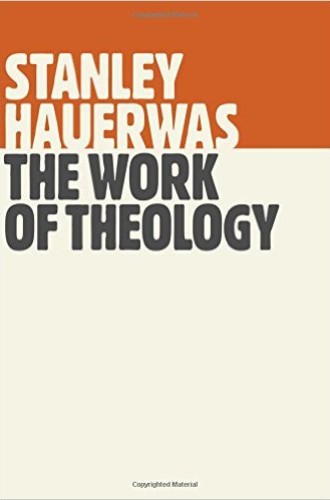The Work of Theology, by Stanley Hauerwas
Longtime readers of Hauerwas will not be surprised to hear that this book is maddening. Nor will they be surprised to hear that some of the most maddening aspects are also the most rewarding. (Others are simply maddening, but more on that later.)
Let us begin with the invigorating frustrations. One’s brow starts to furrow early in the first essay, titled “How I Learned to Think Theologically,” which introduces what the book is about. At first it seems straightforward. It is about practical reasoning, the intellectual virtue that allows particular people in concrete situations to act in ways that make for a good life. After grabbing one’s copy of Aristotle’s Nicomachean Ethics, one feels prepared to proceed.
Not so fast. Within a few sentences one finds that actually the subject of the book is Hauerwas himself. He aims to consider his own practical reasoning over the course of his career. Well, which is it? A book about practical reasoning? Or a Stanley Hauerwas retrospective, emceed by Stanley Hauerwas? We ought to know by now that when Hauerwas makes a seemingly clear question go blurry, he is in fact making his point. The book aims to show us how practical reasoning always follows the contours of a particular life. Often, Hauerwas points out, we will not recognize its operation while it is happening. We see it only when we reflect later.
Read our latest issue or browse back issues.
So The Work of Theology is Hauerwas discussing Hauerwas, but in a very different register from that of his memoir Hannah’s Child. Each chapter treats a domain within Hauerwas’s theology—humor, writing, irony, being Protestant, and so forth—and considers how practical reasoning has worked in those domains. We are meant to understand practical reasoning not as an abstract topic, but as a Christian virtue honed in a particular person’s life, in conversation with many others—in many cases people who are Hauerwas’s friends. Friendship has long been a central theme in Hauerwas’s thought: through friendship virtues are formed and people are transformed. “How one reasons cannot be abstracted from who is doing the reasoning.”
I am glad that he said that, because I must bring a criticism. It has to do with who is doing the reasoning. While reading The Work of Theology, I kept a running tally of whose work got referenced. I counted 20 white women. I also counted two references to women whose racial identity I could not guess at. (One of these was an unnamed Duke colleague, of whom Hauerwas wrote that he “wanted to kill her on the spot” for saying something vapid in a sermon. I counted that as a theological engagement.) As for male thinkers of color, I counted nine, including—rather anachronistically, I realize—Augustine of Hippo.
And then there were the white men. By my count, 163.
What is going on? H. Richard Niebuhr named this the most important moral question, more important than What should I do? In The Work of Theology and elsewhere, Hauerwas urges us to heed Niebuhr’s insight. So I mean only to take Hauerwas seriously by asking: What is going on? A white man is not a bad thing to be, of course. But is it not curious that the conversation convened in The Work of Theology belongs overwhelmingly to white men? Particularly when American Christianity is becoming less white, and most American Christians are women? What are we looking at here?
Might the discrepancy reflect the world of academic theology more broadly? Not entirely. Female scholars make up around 29 percent of religion and theology faculty, according to recent figures from the American Academy of Religion. Compare that to the 11 percent of female interlocutors in The Work of Theology. But Hauerwas is a broad thinker, engaging scholarship from across the humanities. Perhaps the gender discrepancy is simply a function of the imbalance in other humanities disciplines? Yet according to the American Academy of Arts and Sciences, female scholars make up around 25 percent of philosophy faculty—more than twice the representation than they receive in the pages of The Work of Theology. And philosophy is the most male-dominated discipline listed. What about race? Sixteen percent of theology and religion faculty are people of color. Not great, but compare that to The Work of Theology, in which around 6 percent of references come from people of color.
At this point I imagine my Hauerwasian friends rolling their eyes. “Your account proceeds from a liberal starting point that Hauerwas rejects,” I can hear them saying. Except that I have not offered an account yet. I am simply trying to describe what I see. There are more white men in this conversation than one might expect, even using benchmarks drawn from a dominant culture that privileges whiteness and maleness. So what is going on? Lest this sound like an ad hominem argument, note that Hauerwas himself defends the use of ad hominem arguments. Specifically, he says that they “remind . . . us that we inhabit narratives that are often ignored but in fact make all the difference for the position a person holds.”
Amen. So could we notice some of the ignored narratives that this book inhabits?
Could we notice, for instance, who gets invited to give theological descriptions of other people’s lives? Hauerwas approvingly cites this warning from John Milbank: if women alone are given exclusive “rights” over a fetus, says Milbank, men will exercise their implied rights to have nothing to do with their children. No disrespect to Milbank, but why is he the one holding the microphone at that precise moment in the conversation? And why is the topic given drive-by treatment? Why not dwell on the matter a bit longer and cite Margaret Farley, Julie Hanlon Rubio, M. Shawn Copeland, or Lisa Sowle Cahill—all theological ethicists who have written about family, reproduction, and motherhood?
And then there’s poverty. In a chapter called “How to ‘Remember the Poor,’” Hauerwas rightly cautions against turning “the poor” into objects or abstractions. To counteract this tendency, he recommends listening to the poor. For, he says, “to listen to the poor is an exercise of great discipline. . . . We must listen to the stories the poor have to tell because only by listening to such stories do we have the means to know how to go on.” After I read that, I expected that I was a paragraph or two away from reading “the stories the poor have to tell.” But I found no such stories. Why are they not there? Linda Tirado’s recent book Hand to Mouth: Living in Bootstrap America tells her firsthand experiences of poverty. One could also consult the stories and interviews in Sasha Abramsky’s The American Way of Poverty: How the Other Half Still Lives. Or for a more explicitly theological treatment, what about Keri Day’s Unfinished Business: Black Women, the Black Church, and the Struggle to Thrive in America? Though not an autobiographical account, Day’s volume draws on data and narratives showing how poverty is racialized, and how racism works by keeping people poor. Any of these would have helped the chapter tremendously.
What is going on? To be honest, I am not sure. My best guess is that Hauerwas has not entirely reckoned with the ungodly forces that cause privileged people to come by the friendships we have and to convene the conversations we convene. I am grateful for the insights in The Work of Theology, and those with any interest in Hauerwas’s work should certainly read it—at least the excellent chapter called “How to Tell Time Theologically.” Still, I found myself offering this prayer for the author: I pray that in his retirement Hauerwas will find himself blessed with friends from new quarters, and that they will tell him the truth.







